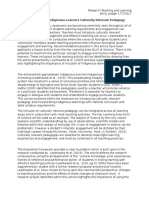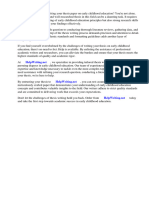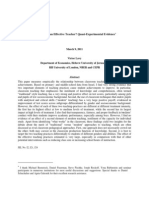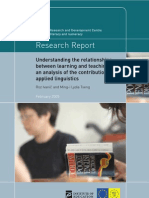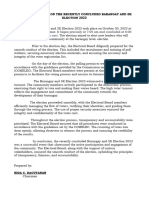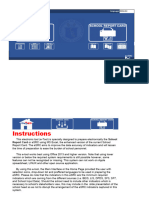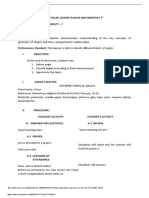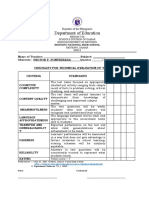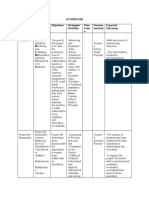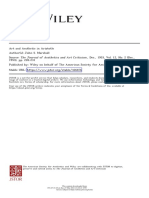0 ratings0% found this document useful (0 votes)
33 viewsCritique Paper
Critique Paper
Uploaded by
NIDA DACUTANANresearch
Copyright:
© All Rights Reserved
Available Formats
Download as DOCX, PDF, TXT or read online from Scribd
Critique Paper
Critique Paper
Uploaded by
NIDA DACUTANAN0 ratings0% found this document useful (0 votes)
33 views4 pagesresearch
Copyright
© © All Rights Reserved
Available Formats
DOCX, PDF, TXT or read online from Scribd
Share this document
Did you find this document useful?
Is this content inappropriate?
research
Copyright:
© All Rights Reserved
Available Formats
Download as DOCX, PDF, TXT or read online from Scribd
Download as docx, pdf, or txt
0 ratings0% found this document useful (0 votes)
33 views4 pagesCritique Paper
Critique Paper
Uploaded by
NIDA DACUTANANresearch
Copyright:
© All Rights Reserved
Available Formats
Download as DOCX, PDF, TXT or read online from Scribd
Download as docx, pdf, or txt
You are on page 1of 4
CRITIQUE PAPER
Teaching Values Education in Schools: The Attitudes, Beliefs and Practices of
Teachers
Differences and similarities between the two contexts are discussed and
conclusions as to the relative importance and influence of teachers to the
development and delivery of Values Education within present and future teacher
education curricula are drawn.
Introduction
This paper addresses some of the many issues raised in the larger research
project. The original study, looking at teachers' understanding of, attitude to and
practice in the area of Values Education, covered practitioners in five countries
(Australia, Ireland, Israel, Slovenia and England) and sought to place the attitudes
of teachers in this study towards Values Education to one of a series of
philosophical stances put forward by Hill (1991). In completing this study the
present authors noted particularly the acknowledged and unacknowledged
influences on teachers of their own cultural and formative heritage and their
frequent unawareness of the source or consequences of these influences. We
therefore embarked on a comparative study using part of our material. The focus
selected here covers the principles that underlie a teacher's attitude to values
education and the informal and formal methods they use to engender these in
the classroom. This paper takes this perspective from a purely Irish and English
viewpoint. In our report we concentrate on the values and practices of a cohort of
primary (first level) teachers and address our remarks to those involved in the
development of teacher education in Ireland and the UK, including the teachers
themselves. The Sample Selected The population surveyed in both parts of the
study under consideration in this 1357-4019/98/03 0115-12 $10.00/0 ©1998 J.
Stephenson & M. Killeavy CHILDREN'S SOCIAL AND ECONOMICS EDUCATION Vol.
3, No. 3, 1998 115 116 Children's Social and Economics Education paper consisted
of a cohort of twenty qualified practising primary teachers in each country. Those
from England were all employed in state rather than privately funded schools; in
Ireland the position was similar in that all schools received state support but were
of course, as is the norm, affiliated to and supported by one or other of the
religious bodies. Of this group of 40 teachers, 15 of those from England and all 20
from Ireland were taking part in two separate degree programmes leading to a
higher award at the respective universities. The gender balance of the sample in
both cases closely reflected the balance found in primary schools within the host
countries. The age profile of the teachers was similarly reflective, in the case of
England ages ranged from 36 to 45+, the Irish teachers tended to be younger,
although all had to have five years' teaching experience before registering for a
master's award. The majority of these first-level teachers had an honours degree.
Some had further qualifications. In both cases teachers were funding their further
study themselves and could be said to demonstrate, by combining study with
their continuing job in schools, a higher degree of commitment than that found in
the average primary school teacher. In this their actions may have some points
which could be expanded for the use of the generality of teachers. All but one
female member (England) of the whole cohort were white and all were leading
what could be termed a middle or lower-middle-class lifestyle, though covering
differing backgrounds originating from a variety of urban, suburban and rural
environments. The schools at which the teachers taught were chosen to give a
spread of school size and geographical/social area, although the teachers were
self-selected in the sense that they volunteered to take part in the project.
Anonymity was guaranteed. Some teachers gave partial answers to questions in
the questionnaire and not all teachers took part in the second (interview) or third
(observation) phase of the study.
The Research Methodology
Primarily a qualitative and a triangulation approach was taken, involving the
administering of a questionnaire, semi-structured interviews and classroom
observation (Cohen & Manion, 1994; Open University, 1988). The original
questionnaire had five open-ended, softly focused questions, of which we will
consider data from three, and was administered to all 40 teachers. A content
analysis of the answers followed and then the data were analysed via a computer
program, 'Hypercal' for the English responses and SPSS (Statistical Package for the
Social Sciences, Norusis, 1990) for the Irish. We shall take data from the
questionnaire responses, backed up by other findings, as the basis of this paper.
Semi-structured interviews and discussion with a sample of the teachers (15 in
England, 8 in Ireland) made up the second stage of the investigation. In this way
further details on ambiguous, unusual or popular topics raised in the
questionnaire were explored and collected. One of the interview sessions held
with the English teachers was a group discussion which involved twelve of the
participants of the award-bearing course. This gave an opportunity for the
correlation of questionnaire responses with orally expressed views, often revised
or restated in the delivery, reflected upon following the responses and remarks of
the peer Teachers and Values Education in Ireland and UK 117 group. All other
interviews were with individuals. Classroom observations of a small number of
teachers from each country (England 3, Ireland 1) made up the third aspect of
information gathering. Classrooms were selected to cover age phase, social area,
size and methodological differences. An attempt was made to minimize the
'observer effect' by making the sessions part of a series of visits for other
purposes.
Contextual Considerations
At this point it is important to consider some aspects of the analysis which were
specific to the context in the country in which they were carried out. Certain
conditions prevail in the two societies which may or may not have a significant
bearing on some of the responses and therefore arguments and conclusions
which follow. Aspects of the analysis pertain in both countries, not necessarily
leading to the same results; others are peculiar to the home situation of the
respective countries. Perhaps the most fundamental was a common area, the
basic subject - Values Education; at the time neither England nor Ireland had a
formal subject in the curriculum with the title 'Values Education', although
Citizenship Education is shortly to form part of the curriculum in English Schools.
This raised subsequent problems for both sets of teachers in that most were
unable to define satisfactorily what the subject meant in formal terms. We think it
fair to say that for the majority this dilemma remained unsolved. Various
suggestions were made as to where 'values' might be taught, amongst them
religious education and personal and social education. The common ground
included the tradition of primary school teachers being individually committed to
the teaching of Religious Education to their classes. This is the influence of
change. In common with most other countries in the developing world, part of
the impetus for the current debate about 'values' has been the perceived decline
in moral and ethical standards within the general population. The old 'certainties'
can no longer be relied upon, it is felt, and there is the perception that a once
virtually universal 'national' set of agreed standards of belief, behaviour and
practice are at best under threat and at worst have already been dismissed. There
is no doubt that both these sets of experienced practising teachers were well
aware of the new, challenging and sometimes threatening demands that are
being placed upon formal and informal education as a result of cultural change.
118 Children's Social and Economics Education We come here to the differences
in degree and time scale between the experiences of change so far impinging on
the educational systems of the two countries, directly and indirectly, as a result of
changes in society. If we stay with our previous area of common issue, that of
faith, belief and practice displayed through the curriculum in schools and the
actions of the teachers within formal and informal teaching, then we find change
in both countries. In Ireland teachers are aware of certain fundamental changes
which will affect the values aspect of Irish education. The development of the new
curriculum areas will reflect the growing concern on the part of the state to take
responsibility for the delineation of the values which are inherent in the new
subject areas of the curriculum. Education and schooling have not been immune
from this trend. Parents no longer necessarily think 'teacher knows best'
particularly if that teacher, either as an individual, or more often as the
representative of a section of society and set of values, reflects a set of values to
which they do not subscribe. In this context and with the constraints, or support,
of the fairly prescriptive national curriculum either curtailing or acting as an
excuse for any lack of reflection or action on the part of the teachers when
considering their own stance to 'values', teachers are now faced with a second
intervention by the state. The inclusion of Citizenship Education into the
curriculum (scheduled for 2000) could be seen as an attempt to redress the
balance between all or some of the interest groups within present-day society, or
as state indoctrination of the values they wish to inculcate into the population, or
any point on the continuum between. Turning to Ireland and the impending
curriculum and philosophical changes, many of the teachers were aware of the
changes in the political culture of the state and were striving to accommodate
more traditional perspectives to the often changing attitudes and outlooks which
their pupils bring from their homes. Findings from the Questionnaire The teachers
were asked to state three essential principles upon which they made their
decisions with regard to the teaching and development of values in the
curriculum programme.
You might also like
- Teach Like A Champion 3-0-63 TechniquesDocument5 pagesTeach Like A Champion 3-0-63 TechniquesBrenda Vargas100% (1)
- Timed Writing 2Document3 pagesTimed Writing 2api-30203286767% (3)
- Qi Men Dun Jia and Feng Shui DivinationDocument16 pagesQi Men Dun Jia and Feng Shui DivinationCarmen Micu100% (2)
- Citizenship EducationDocument9 pagesCitizenship Educationisankurnia100% (2)
- Dvati: Identical TwinsDocument2 pagesDvati: Identical TwinsI love you Evans PeterNo ratings yet
- A To Z Synonyms and Antonyms List With Hindi Meaning PDF Download - Recruitment Topper PDFDocument40 pagesA To Z Synonyms and Antonyms List With Hindi Meaning PDF Download - Recruitment Topper PDFRaghvendra Singh Tomar47% (17)
- Teaching - Values - Education - in Schools: The AttitudesDocument13 pagesTeaching - Values - Education - in Schools: The AttitudesJungkook DimagibaNo ratings yet
- Departmental Differences in Attitudes To Special Educational Needs in The Secondary SchoolDocument8 pagesDepartmental Differences in Attitudes To Special Educational Needs in The Secondary SchoolUSFMFPNo ratings yet
- Assessment 1 - Indigenous Learners Culturally Relevant PedagogyDocument6 pagesAssessment 1 - Indigenous Learners Culturally Relevant Pedagogyapi-321018289No ratings yet
- Sanford, K., Williams, L., Hopper, T., & McGregor, C. (2012) - Indigenous Principles Decolonizing Teacher EducationDocument17 pagesSanford, K., Williams, L., Hopper, T., & McGregor, C. (2012) - Indigenous Principles Decolonizing Teacher Educationdereklau203No ratings yet
- Education in Ireland: Challenge and ChangeFrom EverandEducation in Ireland: Challenge and ChangeSheelagh DrudyNo ratings yet
- Diversity, Multiculturalism, Gender, and Exceptionality in The SocStud ClassroomDocument43 pagesDiversity, Multiculturalism, Gender, and Exceptionality in The SocStud ClassroomJazel May PonteNo ratings yet
- Research Proposal ContentDocument3 pagesResearch Proposal ContentElwen Kyle CervantesNo ratings yet
- Summary HornstraDocument15 pagesSummary HornstraLisa FlowersNo ratings yet
- Children's Rights, Responsibilities and Understandings of School DisciplineDocument19 pagesChildren's Rights, Responsibilities and Understandings of School DisciplineJay GalangNo ratings yet
- Multiple Perspectives On Continuity in Early Learning and The Transition To SchoolDocument27 pagesMultiple Perspectives On Continuity in Early Learning and The Transition To SchoolAna Maria StefanNo ratings yet
- Azhar) Introduction and Methodology of The ArticleDocument5 pagesAzhar) Introduction and Methodology of The ArticleAsad MiraniNo ratings yet
- Educational Early Development Research Example PDFDocument14 pagesEducational Early Development Research Example PDFika aprilia putriNo ratings yet
- PortfolioDocument6 pagesPortfolioapi-360888326No ratings yet
- 6466 1Document18 pages6466 1Sani Khan100% (1)
- From Helsinki To Hollywood - Applying The Finnish Education System in The American Classroom-3Document7 pagesFrom Helsinki To Hollywood - Applying The Finnish Education System in The American Classroom-3Rayhaan HerediaNo ratings yet
- Teachers Attitudes Towards Integration Inclusion A Review of The Literature PDFDocument20 pagesTeachers Attitudes Towards Integration Inclusion A Review of The Literature PDFQuennie ConcoNo ratings yet
- A Tale of Two CountriesDocument36 pagesA Tale of Two CountriesSAMIR ARTURO IBARRA BOLAÑOSNo ratings yet
- Ainscow, Farrell y Tweddle IJIE - 00 Developing Policies For Inclusive EducationDocument19 pagesAinscow, Farrell y Tweddle IJIE - 00 Developing Policies For Inclusive EducationMatías Reviriego RomeroNo ratings yet
- Professiona Attitudes and Experience in Relation To Bilingual Children Attending Language UnitsDocument17 pagesProfessiona Attitudes and Experience in Relation To Bilingual Children Attending Language Unitswasineetip.raiNo ratings yet
- Teacher Learning, Informal and Formal: Results of A Canadian Teachers' Federation SurveyDocument37 pagesTeacher Learning, Informal and Formal: Results of A Canadian Teachers' Federation SurveykavizakavizaNo ratings yet
- Research Proposal ContentDocument7 pagesResearch Proposal ContentElwen Kyle CervantesNo ratings yet
- Thesis Paper On Early Childhood EducationDocument7 pagesThesis Paper On Early Childhood Educationafcnzcrcf100% (1)
- 7 ComberDocument10 pages7 Comberamado737800No ratings yet
- The Teacher S Role in Curriculum Development An Unresolved Issue in English Attempts at Curriculum ReformDocument28 pagesThe Teacher S Role in Curriculum Development An Unresolved Issue in English Attempts at Curriculum ReformRobert MsendoNo ratings yet
- Hallam 2003 Ability 69Document30 pagesHallam 2003 Ability 69VincentNo ratings yet
- Sumeyra Aydogdu 102096 Assignment 1Document10 pagesSumeyra Aydogdu 102096 Assignment 1api-332424736No ratings yet
- Attitudes of Teachers Towards Inclusive EducationDocument14 pagesAttitudes of Teachers Towards Inclusive EducationNeilton Santos FerreiraNo ratings yet
- Teachers Text and Tables March 9 2011Document42 pagesTeachers Text and Tables March 9 2011Borke01No ratings yet
- The Problem and Its Context 1.1Document10 pagesThe Problem and Its Context 1.1Bright MachawiraNo ratings yet
- Teachers Attitudes Towards Integration Inclusion A Review of The LiteratureDocument20 pagesTeachers Attitudes Towards Integration Inclusion A Review of The LiteratureLuthyGay VillamorNo ratings yet
- Management of Curriculum and Instruction-DadizonDocument3 pagesManagement of Curriculum and Instruction-DadizonMhoty FortneyNo ratings yet
- Analysing Attempts To Support Outdoor Learning in Scottish SchoolsDocument24 pagesAnalysing Attempts To Support Outdoor Learning in Scottish SchoolsMarieta ChavezNo ratings yet
- Ade Diaz DimaanoDocument109 pagesAde Diaz DimaanokarlNo ratings yet
- ReferencesDocument4 pagesReferencesVallada, FebroseNo ratings yet
- Cepeowp22 08Document51 pagesCepeowp22 08Renelyn AbejuroNo ratings yet
- Understanding Teachers' Attitudes and Self-Efficacy in Inclusive Education: Implications For Pre-Service and In-Service Teacher EducationDocument19 pagesUnderstanding Teachers' Attitudes and Self-Efficacy in Inclusive Education: Implications For Pre-Service and In-Service Teacher EducationJeanYanNo ratings yet
- Improving Classroom Teaching and Learning: Three Key Ideas: Vena Jules, Anthony Layne, Peter Kutnick and David StephensDocument3 pagesImproving Classroom Teaching and Learning: Three Key Ideas: Vena Jules, Anthony Layne, Peter Kutnick and David StephensElserenocien LlavecienNo ratings yet
- Socialization Processes Social World ChildrenDocument40 pagesSocialization Processes Social World Childrennaresh224No ratings yet
- 1hassessment1Document10 pages1hassessment1api-357444414No ratings yet
- Doctoral ProposalDocument16 pagesDoctoral ProposalThomas McGovernNo ratings yet
- Biculturalism in New Zealand Secondary Schools Carolyn StirlingDocument10 pagesBiculturalism in New Zealand Secondary Schools Carolyn StirlingKhemHuangNo ratings yet
- Analysis of French Immersion Program: A Socio-Political Analysis ShaftyDocument10 pagesAnalysis of French Immersion Program: A Socio-Political Analysis ShaftyIoana TăNo ratings yet
- Politics and PedagogyDocument15 pagesPolitics and PedagogyCarolina NavarroNo ratings yet
- Stage of Curriculum Development and Evaluation in Updating The Entire CurriculumDocument48 pagesStage of Curriculum Development and Evaluation in Updating The Entire CurriculumJalajarani AridassNo ratings yet
- Bilingual 7Document28 pagesBilingual 7Ian SignerNo ratings yet
- Stakeholders' Perceptions On"No Homework Policy" in A Philippine Public Secondary SchoolDocument12 pagesStakeholders' Perceptions On"No Homework Policy" in A Philippine Public Secondary SchoolAngel FerminNo ratings yet
- Ethics Paper-Final DraftDocument19 pagesEthics Paper-Final Draftapi-290229666No ratings yet
- Literature Review Special Education InclusionDocument8 pagesLiterature Review Special Education Inclusionc5ngamsd100% (1)
- Insight: Early Years Education: Perspectives From A Review of The International LiteratureDocument12 pagesInsight: Early Years Education: Perspectives From A Review of The International LiteratureRichard ManongsongNo ratings yet
- Culturally Responsive PedagogyDocument8 pagesCulturally Responsive Pedagogyapi-275322444No ratings yet
- Ligsa SouthClusterDocument25 pagesLigsa SouthClusterIliyasu Salisu KurfiNo ratings yet
- Pre-Service Primary Teachers - Perceptions of Early Childhood PhilDocument14 pagesPre-Service Primary Teachers - Perceptions of Early Childhood PhilshumaiylNo ratings yet
- Research ReportDocument21 pagesResearch ReportTalha AlamNo ratings yet
- Curriculum LoadDocument10 pagesCurriculum Loadnavy100% (1)
- Training Early 2016 - Şebnem Et Al - Childhood Teachers For Sustainability - Towards A Learning Experience of A DifferentDocument31 pagesTraining Early 2016 - Şebnem Et Al - Childhood Teachers For Sustainability - Towards A Learning Experience of A DifferentanaNo ratings yet
- A Peer Mentoring ModelDocument20 pagesA Peer Mentoring ModelMaria Rosari AnggunNo ratings yet
- Hilbert 2014Document11 pagesHilbert 2014zereftheshuskyNo ratings yet
- Grammarly-PROBLEMS ENCOUNTERED BY NEW PRESCHOOL TEACHERS IN SELECTED SCHOOLS OF TACLOBAN CIT1Document25 pagesGrammarly-PROBLEMS ENCOUNTERED BY NEW PRESCHOOL TEACHERS IN SELECTED SCHOOLS OF TACLOBAN CIT1Anonymous cOml7r100% (4)
- (Solveig) Discussing Inclusive Education An Inquiry Into Different Interpretations and A Search For Ethical Aspects of Inclusion Using The Capabilities ApproachDocument13 pages(Solveig) Discussing Inclusive Education An Inquiry Into Different Interpretations and A Search For Ethical Aspects of Inclusion Using The Capabilities ApproachMeliha UygunNo ratings yet
- Narrative Report On The Recently Concluded Barangay and SK Election 2023Document1 pageNarrative Report On The Recently Concluded Barangay and SK Election 2023NIDA DACUTANAN100% (4)
- TEACHERS SUBJECT PROFILING 2023 2024AutoRecoveredDocument8 pagesTEACHERS SUBJECT PROFILING 2023 2024AutoRecoveredNIDA DACUTANANNo ratings yet
- Motiong NHS - SRCDocument75 pagesMotiong NHS - SRCNIDA DACUTANANNo ratings yet
- Home Reading ReportDocument2 pagesHome Reading ReportNIDA DACUTANANNo ratings yet
- SWOTanalysisDocument4 pagesSWOTanalysisNIDA DACUTANANNo ratings yet
- ACR On LAC Least Learned Skills InterventionDocument3 pagesACR On LAC Least Learned Skills InterventionNIDA DACUTANANNo ratings yet
- Co1 2023Document8 pagesCo1 2023NIDA DACUTANANNo ratings yet
- Annotations-RPMS-2021-2022 (AutoRecovered)Document32 pagesAnnotations-RPMS-2021-2022 (AutoRecovered)NIDA DACUTANANNo ratings yet
- Data ANALYSIScreativityDocument14 pagesData ANALYSIScreativityNIDA DACUTANANNo ratings yet
- SMEA 2nd Quarter TemplateDocument2 pagesSMEA 2nd Quarter TemplateNIDA DACUTANANNo ratings yet
- Numeracy Test SynthesisDocument3 pagesNumeracy Test SynthesisNIDA DACUTANANNo ratings yet
- Demo Fourth FINALDocument9 pagesDemo Fourth FINALNIDA DACUTANAN100% (2)
- 2nd COTDocument6 pages2nd COTNIDA DACUTANANNo ratings yet
- 2nd Quarter Exam MATH 7Document3 pages2nd Quarter Exam MATH 7NIDA DACUTANAN50% (2)
- 2nd COTDocument6 pages2nd COTNIDA DACUTANANNo ratings yet
- Demo PlanpythagorasDocument8 pagesDemo PlanpythagorasNIDA DACUTANANNo ratings yet
- Educational ThrustDocument1 pageEducational ThrustNIDA DACUTANAN100% (1)
- Table of Specifications Math 7 Second Quarter 2022 2023Document2 pagesTable of Specifications Math 7 Second Quarter 2022 2023NIDA DACUTANANNo ratings yet
- 1st Quarter Examination Math7 2022 2023Document3 pages1st Quarter Examination Math7 2022 2023NIDA DACUTANANNo ratings yet
- Checklist For Test Itemnm Technical QualitiesDocument1 pageChecklist For Test Itemnm Technical QualitiesNIDA DACUTANANNo ratings yet
- Action Plan in MathematicsDocument2 pagesAction Plan in MathematicsNIDA DACUTANANNo ratings yet
- 1st Quarter Examination Math7 2022 2023Document4 pages1st Quarter Examination Math7 2022 2023NIDA DACUTANANNo ratings yet
- ESP9 Q2 LAS1-WEEK7nidalocalizedDocument10 pagesESP9 Q2 LAS1-WEEK7nidalocalizedNIDA DACUTANANNo ratings yet
- Department RequestDocument4 pagesDepartment RequestNIDA DACUTANANNo ratings yet
- Psa 120-200Document2 pagesPsa 120-200Hannah FigueroaNo ratings yet
- Title - The Hidden Language of Dreams - Exploring The Depths of The Unconscious MindDocument2 pagesTitle - The Hidden Language of Dreams - Exploring The Depths of The Unconscious Mindhaseeb.hussainy14No ratings yet
- GladiatorsDocument8 pagesGladiatorsRaluca OanăNo ratings yet
- Jung's Archetypes in Gilgamesh and BeyondDocument4 pagesJung's Archetypes in Gilgamesh and BeyondSomanNo ratings yet
- Worksheet Essay Practice - Julius CaesarDocument3 pagesWorksheet Essay Practice - Julius CaesarA.S_IN_75100% (2)
- Multivariable Calculus-Course OutlineDocument4 pagesMultivariable Calculus-Course OutlineMaison KidsNo ratings yet
- Science of BreathDocument31 pagesScience of BreathVishvambhar DayalNo ratings yet
- Art of Emerging EuropeDocument56 pagesArt of Emerging EuropeKhelly Joshua UyNo ratings yet
- MODULE 2 LESSON 1 The School Curriculum Definition, Nature and ScopeDocument6 pagesMODULE 2 LESSON 1 The School Curriculum Definition, Nature and Scopeprincess pauline laiz0% (2)
- FAR Module 2Document16 pagesFAR Module 2Fuentes, Ferdelyn F.No ratings yet
- 3 Important Things I Realized From The Reading: My Assessment of Ra1425Document2 pages3 Important Things I Realized From The Reading: My Assessment of Ra1425Hannah LarangjoNo ratings yet
- 162-Texto Del Artículo-1923-1-10-20221230Document15 pages162-Texto Del Artículo-1923-1-10-20221230Diego VargaNo ratings yet
- Ian Gabriel JDocument8 pagesIan Gabriel JJose DacanayNo ratings yet
- Sarte, Patricia Andrae L. - EthicsfinalsDocument21 pagesSarte, Patricia Andrae L. - EthicsfinalsPatricia Andrae L. SarteNo ratings yet
- Black Mirror: Nosedive: Analysis and ThoughtsDocument17 pagesBlack Mirror: Nosedive: Analysis and ThoughtsKaren Kaye PasamonteNo ratings yet
- Selfhood and Identity in Confucianism, Taoism, Buddhism, and HinduismDocument26 pagesSelfhood and Identity in Confucianism, Taoism, Buddhism, and HinduismRondina, Elvie Rose P.No ratings yet
- ADP Semester - 1Document51 pagesADP Semester - 1Muhammad usama shehzadNo ratings yet
- How To Prepera An ORal PresentationDocument1 pageHow To Prepera An ORal Presentationrita.btagNo ratings yet
- Evaluation Rubric For The LDM Implementation Portfolio For TeachersDocument2 pagesEvaluation Rubric For The LDM Implementation Portfolio For TeachersJocelyn Sarmiento100% (1)
- Learning To Think Mathematically: Problem Solving, Metacognition, and Sense Making in Mathematics (Reprint)Document39 pagesLearning To Think Mathematically: Problem Solving, Metacognition, and Sense Making in Mathematics (Reprint)Vilmar Bertotti JuniorNo ratings yet
- The Things They CarriedDocument4 pagesThe Things They CarriedJeremy Keeshin100% (1)
- SG 2 Assignment 1 2 3 4Document11 pagesSG 2 Assignment 1 2 3 4Allen Kurt RamosNo ratings yet
- John S. Marshall Art and Aesthetic in AristotleDocument5 pagesJohn S. Marshall Art and Aesthetic in AristotleCem BoluktasNo ratings yet
- Lesson 1 - Does God Exist?: Year 8 - The Nature and Existence of GodDocument11 pagesLesson 1 - Does God Exist?: Year 8 - The Nature and Existence of GodNathalie DacpanoNo ratings yet
- Matt Vs Japan: 'S Persistent Puzzles Cheat SheetDocument6 pagesMatt Vs Japan: 'S Persistent Puzzles Cheat SheetBlonzarg CedesNo ratings yet








